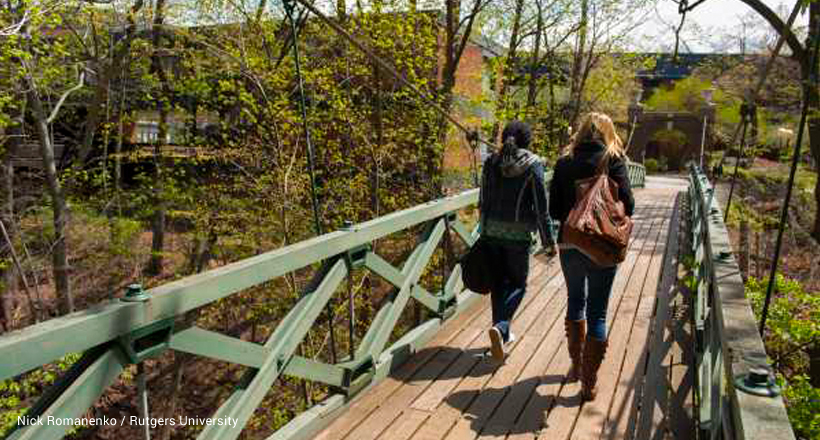CLIMATE PLAN
Rutgers Moves Toward a Climate Action Plan
Rutgers climate task force tackles solutions; committee to evaluate fossil fuels divestment
RUTGERS TODAY – Rutgers has taken the next step toward developing a climate action plan to reduce the university’s carbon footprint and to enhance the ability of Rutgers and the state of New Jersey to manage the risks of a changing climate.
The President’s Task Force on Carbon Neutrality and Climate Resilience this week released an interim report following six months of intensive effort by seven working groups, comprised of faculty, staff, students and other key university community members, as they work to create a climate action plan for Rutgers to be completed in mid-2021. The report follows a pre-planning report released in January that outlined an 18-month process to identify strategies Rutgers will take to help stabilize the global climate by bringing its net human-caused carbon dioxide missions to zero.
“Like COVID-19, the climate crisis creates an urgent need to reassess how we operate as a university and explore the inequities exposed by its effects,” Rutgers President Jonathan Holloway said. “Rutgers has the expertise and values to be a national leader on climate action. I’m grateful for the work of the task force and that our community is embracing that mission.”
In addition, Rutgers announced this week it will further consider a request to divest the university’s endowment from fossil fuel assets. The Joint Committee on Investments of the Board of Governors and Board of Trustees will appoint an ad hoc committee to evaluate divesting from fossil fuel assets, which represent about 6 percent of the nearly $1.4 billion endowment portfolio. The committee will provide a recommendation for the joint committee to consider.
“As the State University of New Jersey, we have a critical role to play in helping the state navigate its way over the coming decades into a climate-positive future,” task force co-chairs Robert Kopp and Kevin Lyons said when presenting the report to Holloway. “Embracing that role wholeheartedly will allow us to serve as a global model for public and public-spirited universities in densely populated regions.”
Kopp, a professor in the Department of Earth and Planetary Science at the School of Arts and Sciences and director of the Rutgers Institute of Earth, Ocean and Atmospheric Sciences, and Lyons, associate professor of professional practice at Rutgers Business School-Newark and New Brunswick and associate director of the Rutgers Energy Institute, said since January the task force expanded its membership to include students and staff from across the university.
In February, the task force held town hall meetings across Rutgers’ campuses to solicit feedback to further develop seven topical themes the working groups were established to explore: energy and buildings; transportation; food systems; supply chain and waste management; land use and offsets; climate preparedness; and climate-positive, equitable economic development.
In March, Rutgers joined the University Climate Change Coalition (UC3), an alliance of leading North American research universities that is creating a collaborative model designed to help local communities achieve climate goals, accelerate the reduction in greenhouse gas emissions and nurture community climate resilience.
The seven working groups will continue to drive the task force by implementing work plans developed over the past several months. They will focus on three aims:
- Establishing a baseline inventory of university greenhouse gas emissions, climate vulnerabilities, and ongoing climate-related activities
- Identifying potential climate solutions for investigation
- Assessing potential climate solutions
Next, the task force will draw upon the working groups’ analyses to develop a set of scenarios for climate action at Rutgers.
The task force will then incorporate the recommendations of the working groups, along with university community feedback, into a climate action plan for the university between March and June 2021. The recommended climate action strategies and implementation plans will then be presented to Holloway and the Board of Governors.
Former president Robert Barchi announced the creation of the task force in September 2019 with the goal of developing a comprehensive climate action plan that identifies pathways to achieving carbon neutrality and ways to reduce university vulnerability to climate impacts.
A leader in climate change research and engagement, Rutgers University is among the top four Big Ten schools in research activity in earth, ocean, and atmospheric sciences, according to the National Science Foundation. Rutgers has already taken substantial steps to reduce its carbon emissions intensity, including building the nation’s largest campus solar facility in 2013, with all new facilities constructed to LEED Silver performance standards. The Rutgers Physical Master Plan, released in 2015, highlights environmental sustainability as a key objective.


